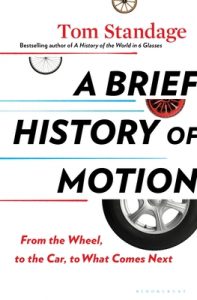EP 512 A New Era in the Car Culture is Emerging
America loves its cars but the romance may be cooling a bit as the increasingly urban society recognizes that the ‘internet of motion’ can provide them with many options for living the life previously available only to someone who had a car. Our guest, Tom Standage, the author of ‘A Brief History of Motion’ takes us through time to see what has become unrecognizable–a whole society built on its transport options. As those options more and more become available on a smartphone, expect that our culture will undergo radical change as well. Our choices going forward in getting around will be abundant from ride sharing to autonomous vehicles to electric scooters. The social transformations spurred by the pandemic and overshadowed by climate change create a unique opportunity to critically reexamine our relationship to the car. In this informative podcast, Tom has some fun facts about the automobile, as well. The road ahead promises some great changes for each of us.

Podcast: Play in new window | Download







